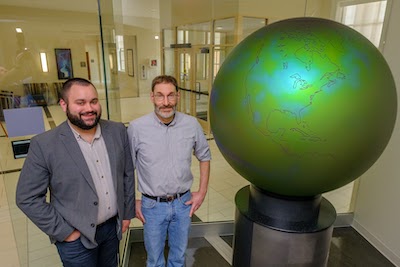Climate Cafe Q and A highlights the progress of the Climate Action Task Force


Adam Sizemore and Jonathan Levy next to the digital globe in Shideler Hall.
Written by Caroline Cruise, CAS communication intern
On November 11, the Miami University Sustainability Office and the Climate Action Task Force hosted their last Climate Café session of the year. Throughout the semester, members of the task force have led discussions on different topics regarding Miami’s effort to achieve carbon neutrality.
The Climate Café’s fifth and final night was a Q-and-A and review with the task force’s co-chairs, Jonathan Levy and Adam Sizemore. Levy is the director of the Institute for the Environment and Sustainability, and Sizemore is the director of sustainability.
Sizemore kicked off the discussion by giving a brief history of the task force, which was established after President Gregory Crawford signed the Presidents’ Climate Leadership Commitment (PCLC) in September 2020. This commitment was created by Second Nature, an environmental organization that specializes in higher education sustainability.
Sizemore explained that the PCLC has three commitment options: carbon, resilience, and climate. “The Carbon Commitment relates to carbon neutrality, and the Resilience Commitment relates to preparing for future climate events and developing measures to prepare for them,” he said.
The Climate Commitment, which President Crawford signed, is a combination of the two, integrating carbon neutrality and resilience.
Making great strides
Levy explained that the task force is putting together two documents: a Campus-Community Resilience Assessment (to be completed by September 2023) and a Climate Action Plan (to be completed by September 2024). The task force will also create a set target date and interim milestones for achieving carbon neutrality.
After Levy and Sizemore were appointed as the task force’s co-chairs, they assembled an executive steering committee to delegate this work. This committee consists of fifteen members that work within a designated area, such as physical facilities, research, and campus/student engagement.
The committee members are in the process of compiling the data and doing the research for their respective sections of the Climate Action Plan. But this work can’t always be completed by one person. Many of the committee members develop sub-committees and involve students in their research.
For example, Levy said that faculty members Cameron Hay-Rollins and Jason Rech, the leaders of the resilience committee, have students working on climate change research. The students have been collecting Oxford/southwest OH temperature data from the 1800s up to today.
“They’re actually going to present it at a local geological meeting next April,” Levy said. “The next step in this process and in this report is to explain how those different temperature change scenarios will impact human health.”
Despite being relatively new, the Climate Action Task Force is making great strides in uniting Miami faculty, students, and the Oxford community to reduce the institution’s carbon footprint.

